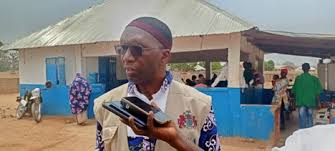By Ndey Sowe
The Gambia’s flagship social protection initiative under the RISE Project is set to expand the Nafa Cash Transfer Programme to sixteen (16) additional districts, bringing the total number of covered districts to thirty-six (36) across the country.
Currently implemented in the 20 poorest districts and reaching sixteen thousand, nine hundred and sixty-six (16,966) households, the Nafa programme will now scale up to include more rural communities, officials confirmed during a field visit in Basse, Upper River Region (URR) on Sunday, 20th July 2025.
“Towards the end of the year, I can say by next month (August 2025), we will start the expansion to 16 other districts in the country, making it 36 districts in total, and we expect to cover additional households in this phase,” said Malang N. Fofana, Executive Director of the National Nutrition Agency (NaNA), during the ongoing bi-monthly Nafa cash distribution.
Fofana hinted that the expansion could go even further: “We will cover all the rural districts from Foni in the West Coast Region (WCR), and all the way from Baja Kunda in URR to Essau in the North Bank Region (NBR). We will be left only with the Kombos, Banjul, and Kanifing Municipality (KM), and hopefully by March 2026, we should be able to launch the third phase of the program.”
Fofana described the Nafa component as part of the broader Gambia RISE Project, a government-led, World Bank-supported initiative valued at $92.71 million. The project is built around five components aimed at addressing human capital gaps through a life-cycle approach.
“Today, we are in Basse witnessing the fifteenth round of cash transfers. This started under the phased-out Social Safety Net Project (SSNP) and has now continued under the Gambia RISE Project,” he noted.
According to Fofana, the program seeks not only to provide cash for basic consumption needs but also to build long-term resilience. “Looking at the Nafa component, we are giving cash to smoothen consumption and ensure they meet their basic needs, but at the same time build resilience by encouraging households to invest the cash into meaningful income-generating activities,” he said.
He emphasized that the program has had a transformative impact. “Nafa is already building the resilience of households. Almost every house in Nafa now has something to lean on when the cash transfer stops,” he added.
Ousman Ceesay, Deputy Permanent Secretary at the Office of the Vice President, which oversees NaNA, expressed satisfaction with the progress of the program during the visit. “We have seen in all the areas we have visited that this is a very impactful project, and it has changed the livelihoods of many rural Gambians,” Ceesay said.
He also highlighted the significance of the Social and Behavioural Change Communication (SBCC) aspect of the program. “The SBCC component cannot be overemphasized. We appreciate the efforts of all partners and assure you of our full participation throughout the span of the project,” he stated.
Alagie Jatta, the Community Development Officer for URR, explained that his office plays a crucial role in mobilizing communities to participate in both the SBCC and other activities under the Gambia RISE Project. He encouraged beneficiaries to make the most of the support they receive. “We urge them to use the money wisely and take the SBCC component seriously,” he said.
The Nafa Program one of the key components of the RISE (Resilience, Inclusion, Skills, and Equality) Project is being jointly implemented by NaNA, the Department of Community Development, and the Directorate of Social Welfare. It combines direct financial support with behavior-change communication aimed at breaking the cycle of intergenerational poverty.
Jointly funded by the World Bank and the Government of The Gambia, the project specifically targets the most vulnerable households in the Western, Lower River, Central River (North and South), and Upper River Regions. Beneficiaries in the poorest districts receive D3,000 every two months, alongside training on health, nutrition, financial literacy, and basic business management.
The current round of Nafa transfers is ongoing across West Coast, Lower River, Central River North and South, and Upper River Regions. The expansion promises to bring much-needed relief and empowerment to thousands more households in rural Gambia.


















